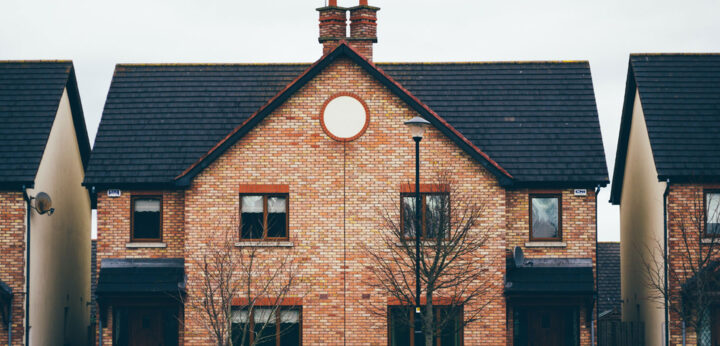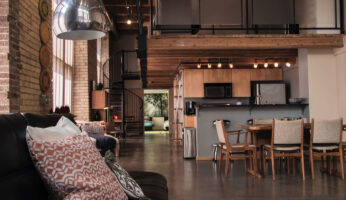Table of Contents
What is a duplex house?
A duplex is a single house that contains two units for two families. These units might be on different levels of the same house, or side-by-side. Each unit in a duplex features a separate door and private rooms, but most duplexes also feature common rooms (e.g. a shared laundry room) as well.
Although living in a duplex means sharing your living space, it’s also much cheaper than living in a single-family home because you can split your living expenses with your neighbors. In Virginia, for example, the average rent for a duplex is about $1,500, whereas the average rent for a single-family house is upwards of $3,000.
What is a duplex apartment?
If you’re a New Yorker, you may also have heard of duplex apartments — two-floor units in which each unit must have a ceiling of at least eight feet. The floors are usually connected by stairs, not elevators.
Despite the similar terminology, duplex apartments are nothing like normal duplexes. Unlike duplexes, they consist of just one unit, usually intended for single families who want the added space and privacy of a second floor.
Although duplexes are common, housing nearly one fifth of Americans, duplex apartments are not. They’re mostly found in NYC and are relatively rare elsewhere.
How do duplexes compare to other forms of housing?
Duplexes are similar to triplexes and fourplexes, which also combine multiple homes in a single building (three and four units respectively, as the names suggest). Duplexes generally have more space than those options, and feel more like single-family homes, whereas triplexes and fourplexes feel like small apartments.
We’ll take a look at how duplexes compare to other common forms of housing below:
Duplex vs. apartment
Apartments are the most common type of shared housing, and the type most people are familiar with.
There are two notable differences between duplexes and apartments:
- Number of units: Most apartment buildings contain a lot of units — generally five or more, and sometimes dozens or hundreds — whereas duplexes only contain two.
- Ownership: Because apartments are so much bigger and more expensive to maintain, they’re generally owned by real-estate companies. Duplexes are often owned by individuals.
Duplex vs. townhouse
Like duplexes, townhouses or townhomes are composed of separate homes that share walls. However, townhouses are found in complexes that consist of long rows of nearly-identical attached buildings. Conversely, a duplex is a single building split into just two units.
Duplex vs. twin home
Twin homes look a lot like duplexes. Both property types consist of two residential units in one building.
However, a duplex comprises a single lot, and is classified as a multi-family home, while each unit in a twin home is technically on its own lot. This means that twin homes usually have two separate owners, each of whom owns their half of the building (and the lot underneath it).
What are the pros and cons of duplexes?
Duplexes balance affordability and quality of life, but may or may not suit your particular needs. We’ve listed the advantages and disadvantages of duplex living below:
Pros of duplexes
There are four major pros to living in a duplex:
Access to amenities
If you want a lot of outdoor space, consider a duplex. You’ll have access to most of the amenities of a single-family home — such as a backyard, a patio, a driveway, and a garage — although you’ll have to share them with your neighbors.
Affordability
Renting a duplex is cheaper than renting a single-family home. Of course, the price of a duplex depends on the area; renting a duplex in New York City will probably be more expensive than renting a house in Anchorage. However, all other things being equal, a duplex is usually the cheaper option.
Privacy
In a duplex, your family will have a set of private rooms, including a kitchen, a dining room, and at least one bedroom, just as you would in a house. You’ll only share one wall with your neighbors, and perhaps a central living room. You can even avoid living with strangers entirely if your family or friends rent the adjacent unit.
Contrast this with an apartment or a condo, in which you’ll most likely have neighbors to the left and right of you, as well as above and below.
More control over common areas
Like duplexes, apartments and condos generally have common spaces, such as lobbies and laundry rooms. However, in apartment buildings and condos, these spaces are designed for and shared by the entire complex, and you don’t have much say in how they’re furnished, used, or decorated.
Conversely, when you share common areas with only one other unit, you can easily negotiate with your neighbors over how to use these spaces.
Cons of duplexes
In spite of their advantages, there are two reasons why you might not want to live in a duplex:
Your neighbor might be your landlord
If you live in a duplex, you’ll have to contend with the inhabitants of the other unit. This isn’t a huge problem if you’re both tenants, or if you’re a landlord and the people in the other unit are your tenants.
On the other hand, if you’re renting your half of the duplex and your landlord lives in the other one, things can get awkward. (Imagine having to knock on your landlord’s door and ask them to keep it down in the evening.) Before entering into an arrangement like that, make sure that you trust your landlord enough to be their next-door neighbor.
No maintenance services
Most large apartments have maintenance workers on hand to take care of day-to-day repairs and provide services like lawn mowing and grass removal. When you live in a duplex, your landlord isn’t responsible for those tasks. You may have to conduct routine maintenance work and find service providers yourself.
Should I rent a duplex?
Duplexes are particularly suitable for certain family situations — for example, if you want to keep an eye on elderly relatives but also give them their personal space, it can be great to have them living right next door. Duplexes are also a good option if you’d like something larger than an apartment for a much lower price, particularly if you’re on good terms with your neighbors and know you’ll get along.
However, there’s no one-size-fits-all solution to housing. The right choice for you depends on your lifestyle, your preferences, and your budget. If you’d rather not share your living space at all and you can afford a single-family home, that might be a better option than a duplex.






